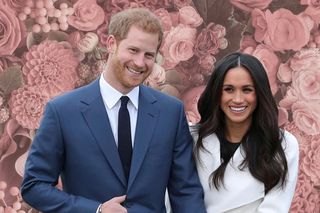
Why We Hate to Love the Royal Wedding
Indians will tune in en masse — despite or because of colonialism?

Prince Harry and Meghan Markle will be married tomorrow, which means that Indians will be staying home to watch live television for a non sports-related reason. For Kate Middleton and Prince William’s wedding in 2011, 42.1 million Indian viewers tuned in. Although we definitely love cricket more — almost 67 million of us watched the 2011 World Cup — it’s fair to assume a sizeable number of eyes will be dragged away from the day’s IPL matches for the latest royal wedding.
The whole world follows the British monarchy, and has done for decades — nearly a billion people watched Charles and Diana’s wedding in 1981. After all, these are some of the only royals left in the world, and they’re the closest thing we have to real-life fairy tales. But India’s fascination with the British royals is particularly interesting, because it’s inseparable from our context as a colonized nation; for several centuries, they were our direct rulers.
That’s not to say that modern Indians feel either answerable to or ownership of the British monarchy. But as products of an intensely impactful colonization, we hold a strange perspective on the current royal family: We recognize the British rule in India was racist, self-serving, and detrimental, but can’t shake an inherited appreciation for British aesthetics, social patterns, and culture.
Most Indians believe the British Raj should never have happened. Beyond the obviously evil premise of white supremacy at the core of Britain’s global colonization, our days under the British Raj left us economically weak and politically upturned. But an undercurrent of colonial culture colors our sensibilities to this day. Because of the British, we still speak English, drink tea — even play cricket.
Even our perspective on modern-day Britain is shaped by colonization. We may have stopped placing as much diplomatic importance on Britain as their economy wanes and ours soars, but the more traditional facets of their culture — like the royals — still appeal to us. And of course, we continue to be the largest group of immigrants to the UK.
Though we’re getting farther and farther away from the date of our independence, the dichotomy prevails. In fact, given that we are among the first generations who never directly experienced the violence and racism of the British Raj, we can enjoy colonial sensibilities without simultaneously dealing with the memory of trauma. Perhaps most ironically, we are rightfully outraged that the Queen still has the stolen Koh-i-Noor in her crown jewels (there are even memes about it), but we nevertheless obsess over The Crown whenever a new season releases on Netflix.
But part of why we love to watch royal weddings is a direct result of our own, uniquely Indian culture, too. We love weddings. Our wedding industry is colossal. When Bollywood royalty gets married, we follow along with rapt attention. (Had Anushka Sharma or Sonam Kapoor televised their wedding ceremonies, the numbers would almost certainly have been through the roof.)
All of this begs the question: Is it so bad to care about the royal wedding, if it’s part of our nature as both a wedding-loving culture and postcolonial people? After all, we’ve managed to claim tea, cricket, and even English as our own.
However, because of the race dynamics of colonization, the way India views modern British royalty is not quite as innocent as our other colonial leftovers. India’s colorism problem is a direct result of our colonization by white conquerors. The British started it all by giving hierarchical preference to lighter-skinned Indians and referring to darker Indians with slurs. Because of them, we place great value on fairness, and the British royals have always been, if you’ll excuse the pun, the fairest of them all.
That’s why it’s particularly great that Meghan Markle is the focus of this upcoming royal wedding — the race hierarchy of the British monarchy is finally being upturned. Markle is a woman of color, she’s a self-made woman, and she’s from the US, a once-colonized nation.
That being said, it’s not hard to imagine the monarchy’s shrewd PR team taking advantage of these very qualities in Markle. The younger members of the monarchy have lately been employed in revitalizing its image. Kate Middleton played a crucial role, as the monarchy’s first ‘commoner,’ in freshening up the elitism that saw the monarchy growing stale in the eyes of the public after Diana’s death. It’s not much of a stretch to picture the monarchy leveraging Markle to curry favor for Britain on future tours of once-colonized nations, like India.
We understand that the monarchy appeals to us because of an unshakeable colonial legacy, but also know that when Prince Harry and Meghan Markle are married tomorrow, we’ll most definitely be glued to our screens. It’s a strange duality, but perhaps this is all we can hope for as a postcolonial culture: that we can address the problematic biases that have led us to feel this way, and then let ourselves enjoy the fairy tale for a few hours.
Urvija Banerji is the Features Editor at The Swaddle, and has previously written for Rolling Stone India and Atlas Obscura. When she's not writing, she can be found in her kitchen, painting, cooking, picking fights online, and consuming large amounts of coffee (often concurrently).
Related


Two Generations Discuss Their Family Histories of Ramzan
